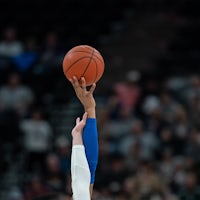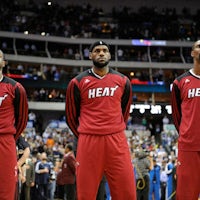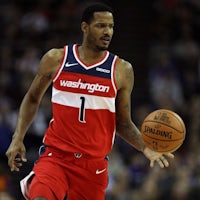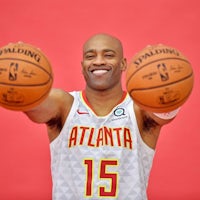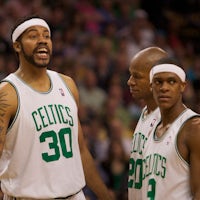Best NBA Betting Apps for 2025
Discover top NBA betting apps for 2025. See reviews, offers, and more. Choose the right NBA sportsbook today with YouBet.
NBA
Best NBA Betting Sites for 2025
Want to know how to bet on the NBA? The list below features the very best NBA betting sites for 2025 and beyond.
NBA
Best NBA Live Betting Strategies for 2025
Discover the best NBA live betting strategies for 2025. Learn tips, spot value in real time, and find top sportsbook offers with YouBet.
NBA
How to Bet on NBA Player Props: Tips, Strategy & Expert Advice
Bet on NBA player props with confidence. Follow expert advice, compare odds, and unlock top sportsbook bonuses with YouBet.
NBA
How to Bet on NBA Playoffs Online: Betting Guide for 2025
Learn how to bet on the NBA Playoffs online in 2025. Get expert tips, odds info, and the best sportsbook offers now with YouBet.
NBA
NBA Point Spread Betting Guide for 2025
Learn how NBA point spread betting works in 2025. Get tips, examples, and top sportsbook bonuses now with YouBet.
NBA
ADVERTISEMENT
How to Bet on the NBA Draft: 2025 Betting Guide
Learn how to bet on the 2025 NBA Draft. Get expert tips, draft odds, and top sportsbook promos now with YouBet.
NBA
Nikola Jokic NBA MVP Odds (2025)
Check Nikola Jokic's 2025 NBA MVP odds. Compare betting lines, track odds movement, and get expert insights on YouBet.
NBA
How to Bet on the NBA Finals Winner (2025)
Learn how to bet on the 2025 NBA Finals winner. Get tips, odds info, and top sportsbook offers now with YouBet.
NBA
How to Bet on NBA MVP: MVP Betting Guide for 2025
Learn how to bet on the 2025 NBA MVP. Get simple tips, odds insights, and top sportsbook offers now with YouBet.
NBA
NBA Western Conference Winner Odds (2025)
Explore 2025 NBA Western Conference winner odds. Compare top contenders, track line movements, and get expert analysis.
NBA
Denver Nuggets Odds, Betting Lines & Spreads (2025)
The Denver Nuggets, the 2023 NBA Champions, are looking to claim their second championship.
NBA
NBA Eastern Conference Winner Odds (2025)
Get the latest NBA Eastern Conference winner odds for 2025. Compare top sportsbooks and bonuses with YouBet.
NBA
NBA Most Improved Player Odds: MIP Betting Favorites (2025)
Explore 2025 NBA Most Improved Player odds. Compare top contenders like Dyson Daniels and Cade Cunningham, track betting lines, and get expert insights on YouBet.
NBA
Denver Nuggets Odds to Win Western Conference (2025)
Check Denver Nuggets odds to win the 2025 Western Conference. Compare futures, betting lines, and expert insights.
NBA
NBA Sixth Man of the Year Odds (2025)
Though most of the focus is on things like NBA MVP, Rookie of the Year, and Defensive Player of the Year, the Sixth Man of the Year award deserves its day in the sun.
NBA
NBA Rookie of the Year Odds (2025)
Explore 2025 NBA Rookie of the Year odds. Compare top contenders, track line movements, and get expert analysis.
NBA
NBA Finals MVP Betting Odds (2025)
Check 2025 NBA Finals MVP betting odds. Compare top candidates, follow odds movement, and get expert insight on award favorites.
NBA
Denver Nuggets Odds to Win the NBA Championship (2025)
Check updated Denver Nuggets odds to win the 2025 NBA Championship. See betting favorites, expert analysis, and best lines.
NBA
Youbet: Weekly bonuses, offers and promotions [March 7-13]
YouBet offers weekly promotions for a variety of players for casinos and sports, including sign-up offers. Get started here!
Blackjack
Youbet: Weekly bonuses, offers and promotions [Feb 28-March 6]
YouBet offers weekly promotions for a variety of players for casinos and sports, including sign-up offers. Get started here!
Blackjack
Top 20 best passers in NBA history
Scorers tend to get most of the glory in the NBA, but many of their highlight-reel baskets wouldn't be possible without the crisp passes of their teammates.
NBA
Top 10 shortest players in NBA history
The NBA is seen as a big man’s game, but over the years, many pint-sized players have found ways to make an impact.
NBA
The best buyout signings in NBA history
These five former castoffs helped their new teams make deep postseason runs following the NBA's buyout deadline.
NBA
The longest winning streaks in NBA history
We’re taking a trip down memory lane to pay tribute to the five longest winnings streaks in NBA history.
NBA
The worst teams in NBA history
Before we rush to anoint the Pistons as one the worst teams of all time, let’s examine 10 other historically awful cellar dwellers, whose feeble feats live on in infamy.
NBA
Top 10 best shooting guards in NBA history
From unstoppable scorers to unbeatable winners, our list of the top 10 shooting guards in NBA history includes some of the best players to ever lace ‘em up.
NBA
The scariest players in NBA history
With Halloween around the corner, we dig into the definitive list of the five scariest to ever haunt the hardwood.
NBA
The greatest comebacks in NBA Finals history
A comeback in an earlier round can make you a hero, but true legends are born when they take place in the NBA Finals, and they can alter the course of a series.
NBA
Ranking the greatest Nets of all time
The Brooklyn Nets have yet to win an NBA championship, but it certainly hasn't been because of a lack of talent. Here are the top five players in franchise history.
NBA
Ranking the greatest Dallas Mavericks of all time
The Dallas Mavericks have only been in the NBA since 1980, but the Mavs' all-time starting five could go toe-to-toe with any franchise in the league.
NBA
Ranking the greatest Portland Trail Blazers of all time
The Portland Trail Blazers were founded in 1970, and have, over the years, assembled enough talent to be competitive against teams from far larger markets and with far larger payrolls.
NBA
The biggest collapses in NBA playoff history
Winning an NBA playoff series is no easy feat, so it isn't surprising when even favored teams falter on basketball's biggest stage.
NBA
Ranking the greatest Detroit Pistons of all time
From the “Bad Boys” era to the “Going to Work” era, the story of the NBA cannot be told without the Detroit Pistons, one of the league’s founding members. Here are their five greatest players ever.
NBA
The best Game 7 performances in NBA playoff history
There are few things in sports more dramatic than a Game 7 in a playoff series. It takes a special player to step up and deliver in these pressure-packed win-or-go-home scenarios.
NBA
Ranking the greatest Los Angeles Clippers of all time
The Clippers have long played second fiddle in Los Angeles to the Lakers, but they've also boasted their fair share of star players, and this list counts down the top five.
NBA
Top 10 players with the most triple-doubles in NBA history
Triple-doubles are seen as signs of complete basketball players. Those who can score, pass, and rebound are multi-dimensional assets that can be trusted to do many different things during a game.
NBA
The biggest upsets in NBA playoff history
Everyone loves an underdog story, and no professional league provides them more often than the NBA.
NBA
Ranking the greatest Atlanta Hawks of all time
Atlanta hasn't won an NBA championship since 1958, but it hasn't been because of a alack of talent. The Hawks have boasted some of the finest players in league history since joining the Association more than 70 years ago.
NBA
Ranking the greatest Phoenix Suns players of all time
From the Mike D’Antoni-coached "Seven Seconds or Less" Suns to the squads led by Charles Barkley in the 1990’s, Phoenix has produced plenty of players whose greatest moments stand the test of time.
NBA
The most traded players in NBA history
Here are the five players who have been traded the most in their NBA careers.
NBA Trade Rumors
The best Big Threes in NBA history
They say that good things come in threes, and that’s especially true in the NBA, where some of the most dominant teams in league history have been powered by high-scoring trios.
NBA
Top 10 best point guards in NBA history
Four of the last five MVPs have been their team's primary ballhandlers, and this year alone, five of the league’s top seven scorers are point guards. Bow down as we rank the top 10 point gods of all time.
NBA
Top 10 youngest players in NBA history
They say that age is just a number, and that's especially true in the NBA, where some of the best players in league history got their start as precocious 18 year-olds.
NBA
Top 10 oldest players in NBA history
These 10 cagey vets are living proof that the NBA is more than just a young man's league.
NBA
Top 10 tallest players in NBA history
If you're looking for a tall tale, you've come to the right place. Join us now as we rank the 10 tallest players in NBA history.
NBA
Top 10 players with the most technical fouls in NBA history
The same tenacity and fire that made these 10 stars legendary also made them among the most penalized players in NBA history.
NBA

Shaquille O'Neal and Kobe Bryant of the Los Angeles Lakers. (Photo by Matt A. Brown/Icon Sportswire)
The best trades in NBA history
Nothing can change a franchise's outlook faster than a good trade. Some of these moves helped lead teams to glory, while others reshaped the landscape of the entire league.
NBA Trade Rumors
The best mid-major stars in NBA history
March Madness is once again showing that players from smaller schools can hold their own against 5-star recruits from college basketball's blue bloods.
NBA
Top 10 best ball handlers in NBA history
Dribbling is the most elemental skill in the game of basketball, and although it’s easy to learn, it’s extremely difficult to master. These 10 men turned it into an absolute art form.
NBA
Top 10 shot blockers in NBA history
Shot-blocking is an art form perfected by some of the best big men in the history of the game, and in this article, we’ll spotlight the top 10 on the NBA career list.
NBA
The 20 Best 3-Point Shooters in NBA History
In honor of the league’s greatest weapon, we’re turning the spotlight on the 20 best 3-point shooters in NBA history.
NBA
The 10 best foreign players in NBA history
Basketball has become a global game, and over the past several decades, some of the best players from around the world have plied their trade in the NBA.
NBA
The 10 best rebounders in NBA history
Scorers get most of the attention in the NBA, but their job often wouldn’t be possible without the big-bodied bangers battling in the paint.
NBA
Top 10 best defensive players in NBA history
Offense may win games, but defense wins championships. Even in an age where teams are scoring more points than ever, those who stand out on the defensive end are usually the biggest winners of all.
NBA
Top 20 best undrafted NBA players of all time
NBA talent evaluators generally do a good job of finding the best players around the world, but every now and again a hidden gem falls through the cracks.
NBA
Top 10 most overrated NBA players of all time
Over the years many NBA players have received a far bigger share of the spotlight than they deserved. Role players have been recast as superstars, and fringe All-Stars have been sold to the public as living legends.
NBA
The best performances in NBA Finals history
The NBA Finals are an opportunity to shine for the game’s best stars, as well as for players that seize the opportunity to propel themselves into the national spotlight when the lights are brightest.
NBA
The greatest comebacks in NBA playoffs history
No lead was safe against these five teams, who overcame enormous odds to pull off the greatest comebacks in NBA playoffs history.
NBA
The best playoff debuts in NBA history
Mavericks forward Luka Dončić has already solidified himself as an NBA legend, after his first postseason appearance. Here are five more of the best playoff series debuts in NBA history.
NBA
Famous firsts in NBA history
Journey back in time as we revisit some of the historic milestones that have shaped the NBA.
NBA
The best 2nd round draft picks in NBA history
Finding a great talent in the second round takes savvy, faith, and more than a little luck, but it is possible. These five players are proof that you can find a franchise player deep in the NBA draft.
NBA
The best stretch fours in NBA history
The rugged power forwards of yesteryear have been replaced by highly-skilled tweeners who stretch defenses to their breaking point with their ability to nail deep threes. Their names aren’t always easy to spell, but they are easy to cheer for as they score from every place imaginable on the court.
NBA

Shaquille O'Neal and Kobe Bryant of the Los Angeles Lakers. (Photo by Matt A. Brown/Icon Sportswire)
Top 5 best duos in NBA history
One of the biggest lessons we learned from The Last Dance is that it takes more than a single star to win an NBA Championship. Michael Jordan was just 1-9 in the playoffs before the Chicago Bulls acquired Scottie Pippen on a draft night trade in 1987. Together they won six titles and were never pushed to a Game 7 in the NBA Finals. Grab your best bud as we salute the five most dynamic duos in NBA history.
NBA
Top 10 best NBA centers of all time
The game may have changed, but the impact of the league’s best big men will live on forever. Join us on a trip down memory lane as we celebrate the top 10 centers in NBA history.
NBA
Top 10 best NBA power forwards of all time
What do Javan Rhinos, Amur Leopards, and NBA power forwards have in common? They’re all on the brink of extinction. The burly boardsmen and bone-rattling pick setters of yesteryear have given way to lithe seven-footers who can stretch the court and rain down threes from far beyond the perimeter.
NBA
Top 10 best small forwards in NBA history
Is there a greater misnomer in basketball than "small forward"? Many of the players who man the position are 6-foot-9 or taller, and their contributions are anything but small.
NBA
The most lopsided rivalries in NBA history
As a gambler it is important to remember past events typically don’t have an effect on future outcomes. Just ask any victim of the roulette wheel. In sports, however, it is hard to ignore when one team seems to have the other’s number.
NBA
The most gruesome injuries in NBA history
Over the years, there have been some terrible injuries in the National Basketball Association. Some have derailed careers, while others have simply ended seasons. Either way, they often leave lasting, cringe-worth images in the memories of both fans and players. We break down the five worst injuries in the history of the NBA.
Injury Reports
Ranking the NBA's best clutch players
When the clock is winding down and the game is on the line, these are the players who specialize in snatching victory from the jaws of defeat. From sharpshooters to stone-cold closers, these are the last people opposing teams want to see with the ball with time running out. BetAmerica takes a look at the five most clutch players in the NBA.
NBA
The worst trade deadline deals in NBA history
With the NBA trade deadline looming, some teams will try to make a last-ditch effort to salvage the season or free up cap space to rebuild. While some moves change the trajectory of a franchise forever, others end in disaster.
NBA Trade Rumors
The best pound-for-pound players in NBA history
Although height is an obvious asset in the NBA, there’s still a spot for small guys, provided they’re talented and tenacious enough to survive. We've identified five pint-sized giant slayers who more than held their own against the game's Golaiths.
NBA
Top 10 most underrated NBA players of all time
Not everyone can average 30 points a game, but there are many NBA players who find ways to contribute to their team’s success in a big way, albeit under the radar. Whether they’re considered unathletic or simply not flashy enough, these are the top 10 most underrated NBA players of all time.
NBA
The biggest No. 1 draft picks in NBA history
Forget everything you've heard about three guard sets and positionless basketball. Size still matters in the NBA, where big brutes are among the most prized commodities in the league. That's just one of the reasons why centers have been nabbed with the first overall pick 45 percent of the time since 1947. We've looked closely at every draft class over the past 72 years and have identified the heftiest No. 1 picks in NBA history. Some were superstars and some were duds, but they were all large and in charge.
NBA




